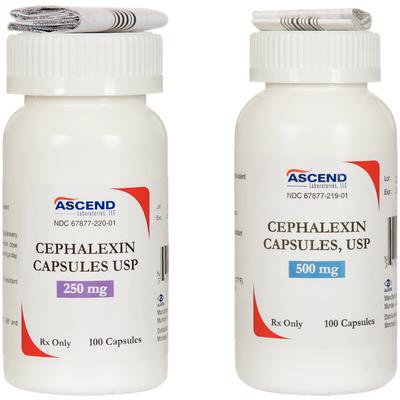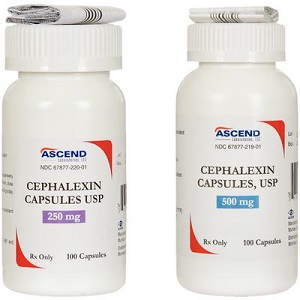Free Delivery on $50+*
Providing Quality & Trust
Cephalexin Capsule
Ascend
$0.43 - $62.00
$0.43 Each
Detailed Description
Cephalexin
(sef-a-lex-in)
- Description: Cephalosporin Antibiotic
- Other Names for this Medication: Keflex®, Rilexene®
- Common Dosage Forms: Veterinary: 250mg & 500 mg chewable tablets.
- Antimicrobial Classification: Highly Important
Prescriber Highlights:
- First-generation oral cephalosporin.
- May be administered with food (especially if GI upset occurs)
- Most likely adverse effects are GI in nature; hypersensitivity reactions are possible.
- Dose may need to be reduced in patients with renal insufficiency.
- This medicine can be given with or without food, but GI side effects might be prevented if given with food.
- The most common side effects are diarrhea, vomiting, and loss of appetite. Contact your veterinarian if your animal develops severe vomiting/diarrhea or rash/itching.
- Be sure to give as long as your veterinarian has prescribed, even if your animal seems better.
- Cephalosporin antibiotics have an odor that resembles cat urine, but this is normal.
How is this medication useful?
In dogs and cats, cephalexin can be useful to help treatinfections of the skin, respiratory tract, and urinary tract. The FDA (U.S. Food & Drug Administration) has approved this drug for use in humans and dogs, butitis not officially approved for use in other species. The FDA does allow veterinarians to prescribe and use human products containing this drug in animals in certain situations. You and your veterinarian can discuss why this drug is the most appropriate choice
Key Information:
- Can be given with or withoutfood, but gastrointestinal side effects (eg, loss of appetite, vomiting, diarrhea) might be prevented if given with food. If your pet vomits or acts sick after receiving the drug on an empty stomach, try giving the next dose with food or a small treat. If vomiting continues, contact your veterinarian.
- Most common side effects are diarrhea, vomiting, and loss of appetite.
- Be sure to give as long as your veterinarian has prescribed, even if your animal seems better.
- Cephalosporin antibiotics have an odor thatresembles cat urine, butthis is normal.
Uses/Indications:
Cephalexin is labeled for the treatment of secondary superficial bacterial pyoderma in dogs caused by susceptible strains of Staphylococcus pseudintermedius. Cephalexin has also been used clinically in cats, horses, rabbits, ferrets, and birds, particularly for susceptible staphylococcal infections. Cephalexin is considered a first-tier drug for the treatment of bacterial skin infections. Although a small study reported efficacy of cephalexin for uncomplicated cystitis, bacterial susceptibility patterns have suggested cephalexin is not an ideal empiric antibiotic for treating UTI in dogs and cats.
The World Health Organization has designated cephalexin as a Highly Important antimicrobial for human medicine.
What are the side effects of this medication?
Side effects that usually are not serious include:
- Diarrhea, vomiting, and loss of appetite.
You don’t have to be overly concerned if you see any of these signs unless they are severe, worsen, or continue to be a problem. Contact your veterinarian if this happens.
Side effects that may be serious orindicate a serious problem:
- Complete loss of appetite in cats can sometimes cause severe liver problems.
- Fever, rashes, trouble breathing, and anemia, which may be allergic reactions to the drug.
- Severe skin irritation may occur in certain cats.
If you see any of these signs, contact your veterinarian immediately.
Important Information:
Cephalosporins are contraindicated in patients with a history of hypersensitivity to them. Because there may be cross-reactivity, cephalosporins should be used cautiously in patients that are documented hypersensitive to other β-lactam antibiotics (eg, penicillins, cephamycins, carbapenems). Use of cephalosporins in patients that are documented to be hypersensitive to penicillin-class antibiotics is controversial. In humans, it is estimated that 1% to 15% of patients hypersensitive to penicillins will also be hypersensitive to cephalosporins. The incidence of cross-reactivity in veterinary patients is unknown.
Cephalosporins should be used with caution in patients with impaired renal function; dosage reduction may be considered in patients with marked renal impairment.
Oral systemic antibiotics should not be administered in patients with septicemia, shock, or other grave illnesses, as absorption of the medication from the GI tract may be significantly delayed or diminished. Parenteral routes (preferably IV) should be used for these cases.
Cephalexin can be easily confused with other cephalosporins. Writing orders and prescriptions using tall man letters may help: cephaLEXin.

Powered by nopCommerce
This site is running in live payment mode. Real payments will be processed.

